| | |||||||||||||||||||||||||||||||||||||||||||||||||||||||||||||||||||||
| |||||||||||||||||||||||||||||||||||||||||||||||||||||||||||||||||||||
All 650 seats in the House of Commons of the United Kingdom 326 seats needed for a majority | |||||||||||||||||||||||||||||||||||||||||||||||||||||||||||||||||||||
| Turnout | 66.4% | ||||||||||||||||||||||||||||||||||||||||||||||||||||||||||||||||||||
|---|---|---|---|---|---|---|---|---|---|---|---|---|---|---|---|---|---|---|---|---|---|---|---|---|---|---|---|---|---|---|---|---|---|---|---|---|---|---|---|---|---|---|---|---|---|---|---|---|---|---|---|---|---|---|---|---|---|---|---|---|---|---|---|---|---|---|---|---|---|
This lists parties that won seats. See the complete results below.
| |||||||||||||||||||||||||||||||||||||||||||||||||||||||||||||||||||||
This is the results breakdown of the 2015 United Kingdom general election.
| | |||||||||||||||||||||||||||||||||||||||||||||||||||||||||||||||||||||
| |||||||||||||||||||||||||||||||||||||||||||||||||||||||||||||||||||||
All 650 seats in the House of Commons of the United Kingdom 326 seats needed for a majority | |||||||||||||||||||||||||||||||||||||||||||||||||||||||||||||||||||||
| Turnout | 66.4% | ||||||||||||||||||||||||||||||||||||||||||||||||||||||||||||||||||||
|---|---|---|---|---|---|---|---|---|---|---|---|---|---|---|---|---|---|---|---|---|---|---|---|---|---|---|---|---|---|---|---|---|---|---|---|---|---|---|---|---|---|---|---|---|---|---|---|---|---|---|---|---|---|---|---|---|---|---|---|---|---|---|---|---|---|---|---|---|---|
This lists parties that won seats. See the complete results below.
| |||||||||||||||||||||||||||||||||||||||||||||||||||||||||||||||||||||
This is the results breakdown of the 2015 United Kingdom general election.
| | This section needs expansion. You can help by adding to it. (June 2015) |
The shares of votes of each party changed as follows:
| Party | 2010% | 2015% | ∆% |
|---|---|---|---|
| Conservative Party | 36.1 | 36.8 | +0.7 |
| Labour Party | 29.0 | 30.5 | +1.5 |
| Scottish National Party | 1.7 | 4.7 | +3.0 |
| Liberal Democrats | 23.0 | 7.9 | −15.1 |
| Green Party | 0.9 | 3.8 | +2.9 |
| UK Independence Party | 3.1 | 12.7 | +9.6 |
| Other | 6.2 | 3.6 | −2.6 |
| Totals | 100.0 | 100.0 | – |
The following table is a list of seats changing hands as a result of the election based on the results of the 2015 election compared to the General Election held in May 2010, [1] and so notwithstanding the results of by-elections to the 55th Parliament.
The Conservative Party became the first party in government since the 1983 general election to increase the number of seats they held at a general election. In total they gained 24 seats to win an overall majority of 12. [2] They gained six seats from Labour in England and two in Wales, while also winning 16 seats from their former coalition partners, the Liberal Democrats.
The Labour Party had a net loss of 26 seats, see table below. Although they did gain twelve seats in England from the Conservatives (eight of them in London) and 23 from the Liberal Democrats, they suffered their worst defeat in Scotland in the age of universal suffrage, losing forty of their forty-one seats to the Scottish National Party (SNP). [3] They also had a net loss of one seat in Wales. [4] Ed Miliband immediately resigned as leader, handing over temporarily to deputy leader Harriet Harman.
The SNP enjoyed their best election result, gaining forty seats from Labour and ten from the Liberal Democrats to hold 56 of Scotland's 59 constituencies. [3] The other parties held one seat each.
The Liberal Democrats had been part of a coalition government with the Conservatives prior to the election with 57 seats in parliament. However, they held just eight seats, their worst election result since the old Liberal Party secured six seats in 1970. [5] Of the five Liberal Democrat cabinet ministers, three lost their seats. [6] They also lost 338 deposits. [7] As a result, Nick Clegg, although he was one of the two surviving ministers, resigned as leader. [6]
The Green Party and UK Independence Party (UKIP) each held one seat: UKIP, however, failed to defend Rochester and Strood, which it had won in a by-election in 2014. [8]
| Affiliation | Members | |
|---|---|---|
| Conservative Party | 318 | |
| Labour Party | 206 | |
| Liberal Democrats | 6 | |
| UK Independence Party | 1 | |
| Green Party | 1 | |
| Speaker | 1 | |
| Total | 533 | |
| Affiliation | Members | |
|---|---|---|
| Conservative | 52 | |
| Labour | 4 | |
| Liberal Democrats | 1 | |
| UKIP | 1 | |
| Total | 58 | |
| Affiliation | Members | |
|---|---|---|
| Conservative | 32 | |
| Labour | 14 | |
| Total | 46 | |
| Affiliation | Members | |
|---|---|---|
| Labour | 45 | |
| Conservative | 27 | |
| Liberal Democrats | 1 | |
| Total | 73 | |
| Affiliation | Members | |
|---|---|---|
| Labour | 26 | |
| Conservative | 3 | |
| Total | 29 | |
| Affiliation | Members | |
|---|---|---|
| Labour | 51 | |
| Conservative | 22 | |
| Liberal Democrats | 2 | |
| Total | 75 | |
| Affiliation | Members | |
|---|---|---|
| Conservative | 78 | |
| Labour | 4 | |
| Green | 1 | |
| Speaker | 1 | |
| Total | 84 | |
| Affiliation | Members | |
|---|---|---|
| Conservative | 51 | |
| Labour | 4 | |
| Total | 55 | |
| Affiliation | Members | |
|---|---|---|
| Conservative | 34 | |
| Labour | 25 | |
| Total | 59 | |
| Affiliation | Members | |
|---|---|---|
| Labour | 33 | |
| Conservative | 19 | |
| Liberal Democrats | 2 | |
| Total | 54 | |
| Affiliation | Members | |
|---|---|---|
| Labour Party | 25 | |
| Conservative Party | 11 | |
| Plaid Cymru | 3 | |
| Liberal Democrats | 1 | |
| Total | 40 | |
| Affiliation | Members | |
|---|---|---|
| Scottish National Party | 56 | |
| Labour | 1 | |
| Conservative | 1 | |
| Liberal Democrats | 1 | |
| Total | 59 | |
| Affiliation | Members | |
|---|---|---|
| DUP | 8 | |
| Sinn Féin | 4 | |
| SDLP | 3 | |
| UUP | 2 | |
| Independent | 1 | |
| Total | 18 | |
In British politics, a Lib–Lab pact is a working arrangement between the Liberal Democrats and the Labour Party.
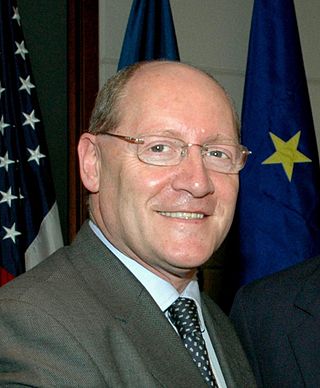
The 2004 European Parliament election was the United Kingdom's part of the wider 2004 European Parliament election which was held between 10 and 13 June 2004 in the 25 member states of the European Union. The United Kingdom's part of this election was held on Thursday 10 June 2004. The election also coincided with the 2004 local elections and the London Assembly and mayoral elections. In total, 78 Members of the European Parliament were elected from the United Kingdom using proportional representation.

The 2010 United Kingdom general election was held on Thursday 6 May 2010, with 45,597,461 registered voters entitled to vote to elect members to the House of Commons. The election took place in 650 constituencies across the United Kingdom under the first-past-the-post system.

The 2011 Scottish Parliament election was held on Thursday, 5 May 2011 to elect 129 members to the Scottish Parliament.

The Liberal Democrats are a liberal political party in the United Kingdom, founded in 1988. Since the 1992 general election, with the exception of the 2015 general election, they have been the third-largest UK political party by the number of votes cast. They have 15 members of Parliament in the House of Commons, 84 members of the House of Lords, four Members of the Scottish Parliament and one member in the Welsh Senedd. The party has nearly 3,000 local council seats. The party holds a twice-per-year Liberal Democrat Conference, at which party policy is formulated. In contrast to its main opponents' conference rules, the Lib Dems grant all members attending its Conference the right to speak in debates and vote on party policy, under a one member, one vote system. The party also allows its members to vote online for its policies and in the election of a new leader. The party served as the junior party in a coalition government with the Conservative Party between 2010 and 2015; with Scottish Labour in the Scottish Executive from 1999 to 2007, and with Welsh Labour in the Welsh Government from 2000 to 2003 and from 2016 to 2021.
This article lists the election results and representation of the UK Independence Party (UKIP) with respect to the House of Commons of the United Kingdom, Scottish Parliament, Senedd, Northern Ireland Assembly, London Assembly, European Parliament and local authorities.
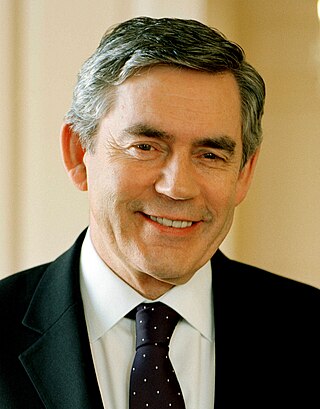
The United Kingdom general election debates of 2010 consisted of a series of three leaders' debates between the leaders of the three main parties contesting the 2010 general election: Gordon Brown, Prime Minister and leader of the Labour Party; David Cameron, Leader of the Opposition and Conservative Party; and Nick Clegg, leader of the third largest political party in the UK, the Liberal Democrats. They were the first such debates to be broadcast live in the run-up to a UK election.
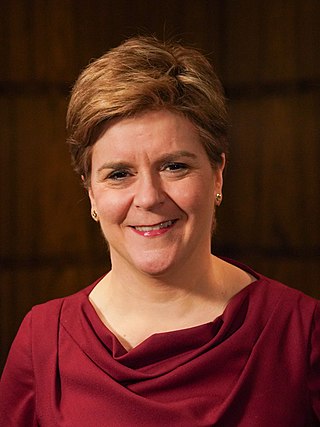
The 2021 Scottish Parliament election took place on 6 May 2021, under the provisions of the Scotland Act 1998. All 129 Members of the Scottish Parliament were elected in the sixth election since the parliament was re-established in 1999. The election was held alongside the Senedd election, English local elections, London Assembly and mayoral election and the Hartlepool by-election.
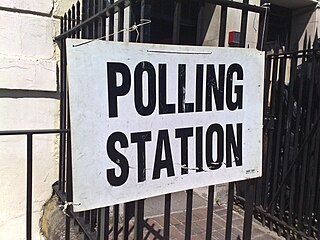
The events surrounding the formation of the United Kingdom's government in 2010 took place between 7 May and 12 May 2010, following the 2010 general election, which failed to produce an overall majority for either of the country's two main political parties. The election, held on 6 May, resulted in the first hung parliament in the UK in 36 years, sparking a series of negotiations which would form the first coalition government since the Second World War.

The 2014 European Parliament election was the United Kingdom's component of the 2014 European Parliament election, held on Thursday 22 May 2014, coinciding with the 2014 local elections in England and Northern Ireland. In total, 73 Members of the European Parliament were elected from the United Kingdom using proportional representation. England, Scotland and Wales use a closed-list party list system of PR, while Northern Ireland used the single transferable vote (STV).

On 9 October 2014, a by-election was held for the UK parliamentary constituency of Clacton in Essex, England. The by-election was triggered by the Conservative MP for Clacton, Douglas Carswell, defecting to the UK Independence Party (UKIP) and subsequently resigning his seat to seek re-election as its candidate.

The 2015 United Kingdom general election was held on Thursday 7 May 2015 to elect 650 Members of Parliament to the House of Commons. It was the only general election held under the rules of the Fixed-term Parliaments Act 2011 and was the last general election to be held before the United Kingdom would vote to end its membership of the European Union (EU). Local elections took place in most areas of England on the same day.
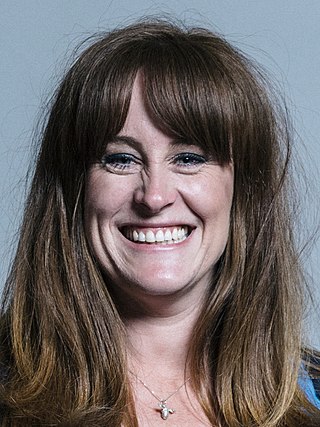
A by-election was held on 20 November 2014 for the UK parliamentary constituency of Rochester and Strood in Kent, England. The sitting Member of Parliament (MP) Mark Reckless called it on joining the UK Independence Party (UKIP), from the Conservatives. He resigned his seat.
The 2015 United Kingdom general election debates were a series of four live television programmes featuring the leaders of seven main British parties that took place during the run-up to the general election. They each featured different formats and participants.
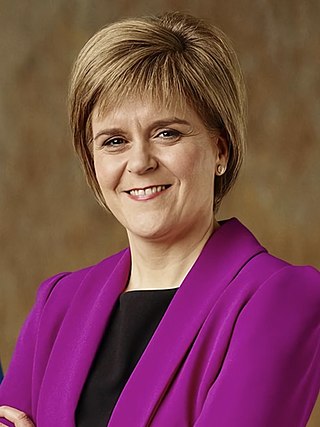
A general election was held in the United Kingdom on 7 May 2015 and all 59 seats in Scotland were contested under the first-past-the-post, single-member district electoral system. Unlike the 2010 general election, where no seats changed party, the Scottish National Party (SNP) won all but three seats in Scotland in an unprecedented landslide victory, gaining a total of 56 seats and taking the largest share of the Scottish vote in sixty years, at approximately 50 per cent. The Labour Party suffered its worst ever election defeat in Scotland, losing 40 of the 41 seats it was defending, including the seats of Scottish Labour leader Jim Murphy and the then Shadow Foreign Secretary Douglas Alexander. The Liberal Democrats lost ten of the eleven seats they were defending, with the then Chief Secretary to the Treasury Danny Alexander and former leader Charles Kennedy losing their seats. The election also saw the worst performance by the Scottish Conservative Party, which received its lowest share of the vote since its creation in 1965, although it retained the one seat that it previously held. In all, 50 of the 59 seats changed party, 49 of them being won by first-time MPs.

The 2015 United Kingdom general election in England was held on Thursday, 7 May 2015 for 533 English seats to the House of Commons. The Conservatives won a majority of seats in England for the second time since 1992.

The 2017 United Kingdom general election was held on Thursday 8 June 2017, two years after the previous general election in 2015; it was the first since 1992 to be held on a day that did not coincide with any local elections. The governing Conservative Party remained the largest single party in the House of Commons but lost its small overall majority, resulting in the formation of a Conservative minority government with a confidence and supply agreement with the Democratic Unionist Party (DUP) of Northern Ireland.

A general election was held in the United Kingdom on Thursday 8 June 2017; all 59 seats in Scotland were contested under the first-past-the-post electoral system.

The 2017 United Kingdom general election in England was held on Thursday 8 June 2017 across 533 constituencies within England.
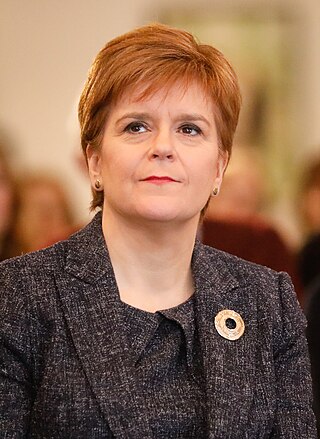
The 2019 United Kingdom general election was held on Thursday 12 December 2019, two and a half years after the previous general election in June 2017. The Scottish National Party (SNP) received the most votes and won 48 out of 59 seats—a gain of 13 over those won in 2017, and 81% of the Scottish seats in the House of Commons.